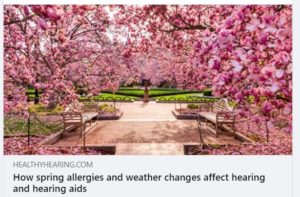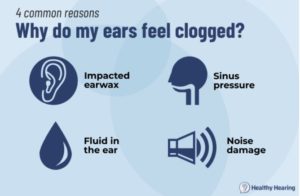Did you know that springtime allergies can affect your hearing?
Another great article in Healthy Hearing by Joy Victory titled: Spring allergies and weather changes: Are your ears ready?
 For all of the joys spring brings us, from the first crocuses emerging to feeling the warmth of the sun on our skin for the first time in months, it also brings rain, erratic temperature shifts and seasonal allergies. All of which can play havoc with your ears and hearing.
For all of the joys spring brings us, from the first crocuses emerging to feeling the warmth of the sun on our skin for the first time in months, it also brings rain, erratic temperature shifts and seasonal allergies. All of which can play havoc with your ears and hearing.
Changes in Barometric Pressure
The inner ear is filled with fluid, and that fluid is extremely sensitive to the sudden changes in barometric pressure that occur in springtime. When the barometric pressure drops rapidly, that means the pressure outside your ears goes down before the pressure inside your ears can acclimate. The result is a pressure imbalance, which can cause a sensation of fullness or popping in the ears. Seasonal allergies exacerbate the problem by causing a narrowing of the Eustachian tube, making equalization of pressure even more difficult.
Those with Meniere’s disease, in particular, can suffer greatly during spring weather changes. Normally fluids in the inner ear circulate; problems occur when the overproduction of fluid that characterizes Meniere’s disease actually backs up under the increased pressure and causes the endolymphatic chambers to bulge. The result is discomfort, fullness and pressure along with the potential of other unpleasant symptoms such as hearing loss, tinnitus and vertigo.
 Seasonal allergies and stuffy ears
Seasonal allergies and stuffy ears
Allergies are another unwanted accompaniment to spring. While most think of allergies as sneezing and sinus pressure, it is important to remember that the ears and sinuses are interconnected.
“People take it for granted that allergies cause sneezing in the nose and itching in the eyes. Yet they seem surprised to learn allergies inevitably affect their ears as well,” said Dr. Ronna Fisher, Au.D.
According to the Asthma and Allergy Foundation, seasonal allergies affect between 10 and 30 percent of adults in the U.S. and as many as 40 percent of children, which means as many as 60 million people in the U.S. suffer from not only sneezing, itchy eyes, itchy ears, and sinus pressure, but ear pressure as well. The warm, wet weather of spring causes trees to produce more pollen. For those who are allergic, the immune system reacts by producing antibodies.
Those antibodies release a substance called histamine, which leads to increased mucus production. Unfortunately allergies also cause swelling of the Eustachian tubes, meaning they don’t open as they should. This causes the Eustachian tubes to become clogged with the excess fluid and wax, and the result is a feeling of fullness and pressure in the ears that can negatively affect hearing.
How to cope with stuffy ears
Clogged ears can have several causes; this time of year it’s likely allergy-related. Over-the-counter antihistamines or decongestants might help relieve the problem of excess fluid if it is caused by allergies. Some other remedies that can reduce fluid build-up include exercising, eating a low-sodium diet, or eating fruits and vegetables that act as diuretics—grapes, watermelon, celery, bell peppers and asparagus all offer health benefits that include reducing fluid retention.
Moisture impacts hearing aids
Spring also brings challenges for those with hearing aids, as the rise in allergens and wet weather means paying closer attention to maintenance and upkeep of hearing devices. For example, increased allergens can clog microphone ports in hearing aids, so be sure to clean hearing aids regularly and replace covers of mic ports when necessary.
Read the full article which also shares how to keep your hearing aids dry by CLICKING HERE
We are here to help if you or a family member is having any difficulties with hearing, hearing aids, hearing aid apps or Tinnitus please give us a call at 727-323-2471 and set up an appointment.
We can help you.
Susan E. Terry, Au.D., F-AAA, F-NAP
Doctor of Audiology
Board Certified
P.S. We are here to help if you have any questions about your hearing, feel free to give us a call at 727-323-2471